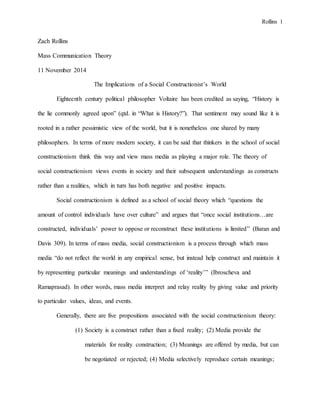
Rollins - Implications of Social Constructionism
- 1. Rollins 1 Zach Rollins Mass Communication Theory 11 November 2014 The Implications of a Social Constructionist’s World Eighteenth century political philosopher Voltaire has been credited as saying, “History is the lie commonly agreed upon” (qtd. in “What is History?”). That sentiment may sound like it is rooted in a rather pessimistic view of the world, but it is nonetheless one shared by many philosophers. In terms of more modern society, it can be said that thinkers in the school of social constructionism think this way and view mass media as playing a major role. The theory of social constructionism views events in society and their subsequent understandings as constructs rather than a realities, which in turn has both negative and positive impacts. Social constructionism is defined as a school of social theory which “questions the amount of control individuals have over culture” and argues that “once social institutions…are constructed, individuals’ power to oppose or reconstruct these instit utions is limited” (Baran and Davis 309). In terms of mass media, social constructionism is a process through which mass media “do not reflect the world in any empirical sense, but instead help construct and maintain it by representing particular meanings and understandings of ‘reality’” (Ibroscheva and Ramaprasad). In other words, mass media interpret and relay reality by giving value and priority to particular values, ideas, and events. Generally, there are five propositions associated with the social constructionism theory: (1) Society is a construct rather than a fixed reality; (2) Media provide the materials for reality construction; (3) Meanings are offered by media, but can be negotiated or rejected; (4) Media selectively reproduce certain meanings;
- 2. Rollins 2 (5) Media cannot give an objective account of social reality—all facts are interpretations. (McQuail 101). At face value, it seems that social constructionism offers a rather pessimistic view when it comes to studying the public and generally views the media as playing a powerful role in society. As previously mentioned, social constructionism posits media as playing a role in the construction and maintenance of reality and argues that “media institutions are those who…offer a first reflection of reality, a first level of reality construction (Abrudan 114). Although the theory of social constructionism may sound negative because of its emphasis on an individual’s reliance on mass media to interpret his or her world, proponents of social constructionism tend to point to obvious benefits in particular situations. The first of those benefits relates to the how social construction approaches media effects on certain cultural groups. Mass media such as television and even new media such as the internet, for instance, may offer an immigrant “a unique opportunity to take a quick view of the American society,” which could potentially play a role in preventing overwhelming culture shock for the individual (Lee 772). A second benefit which some social constructionists point to is that the notion of “reality as a construct” often translates into an individual experiencing a “sense of belonging in society” and that media plays an important role in establishing “our own sense of our own value, our own position and our own rights” (Ibroscheva and Ramaprasad). Those two benefits, however, also have negative ramifications. Although certain cultural groups such as immigrants could in principle benefit from media’s reflection of American culture, the end result is the individual experiencing “fundamentally different social perceptions and behavioral patterns than that acquired via direct experience,” and because an acculturating individual may be more susceptible to mass media messages, he or she could very well “perceive
- 3. Rollins 3 an often exaggerated version of affluence in the host-society” (Lee 772). Moreover, the notion of “reality as a construct” could also mean the perpetuation of stereotypes by the media. It is important to note that although stereotyping often has a negative connotation, stereotypes are sometimes viewed as “cognitive maps” which assist in “organizing and categorizing the large volume of information that individuals receive and process in social interactions ” (Ibroscheva and Ramaprasad). In the end, however, stereotypes are widely defined as “overgeneralizations about members of a social group” which could potentially result in negative repercussions for society, such as prejudice against certain groups. Ultimately, the societal implications from a social constructionism standpoint are rather negative. Although the notion of “reality as a construct” could potentially have the outcome of an individual feeling a sense of belonging, “reality as a construct” could also mean the perpetuation of stereotypes. Further, mass media’s reflection of a particular country’s culture could have a positive impact on immigrants, but for the most part, messages in the media reflect an often exaggerated version of that society.
- 4. Rollins 4 Works Cited Abrudan, Elena. “Mass-media and the social construction of reality.” Journal of Media Research 2 (2008): 14-18. Web. 10 Sept. 2014. Baran, Stanley J., and Dennis K. Davis. Mass Communication Theory: Foundations, Ferment, and Future. 7th ed. Stamford, Connecticut: Cengage Learning, 2014. Print. Ibroscheva, Elza, and Jyotika Ramaprasad. “Do media matter? A social construction model of stereotypes of foreigners.” Journal of Intercultural Communication 16 (2008): n. pag. Web. 10 Sept. 2014. Lee, Wei-Na. “The Mass-Mediated Consumption Realities of Three Cultual Groups.” Advances in Consumer Research 16 (1989): 771-778. Web. 10 Sept. 2014. McQuail, Denis. McQuail’s Mass Communication Theory. 6th ed. London: SAGE Publications, 2010. E-book. “What is History?” UNF.edu. University of North Florida, n.d. Web. 9 Sept. 2014.
